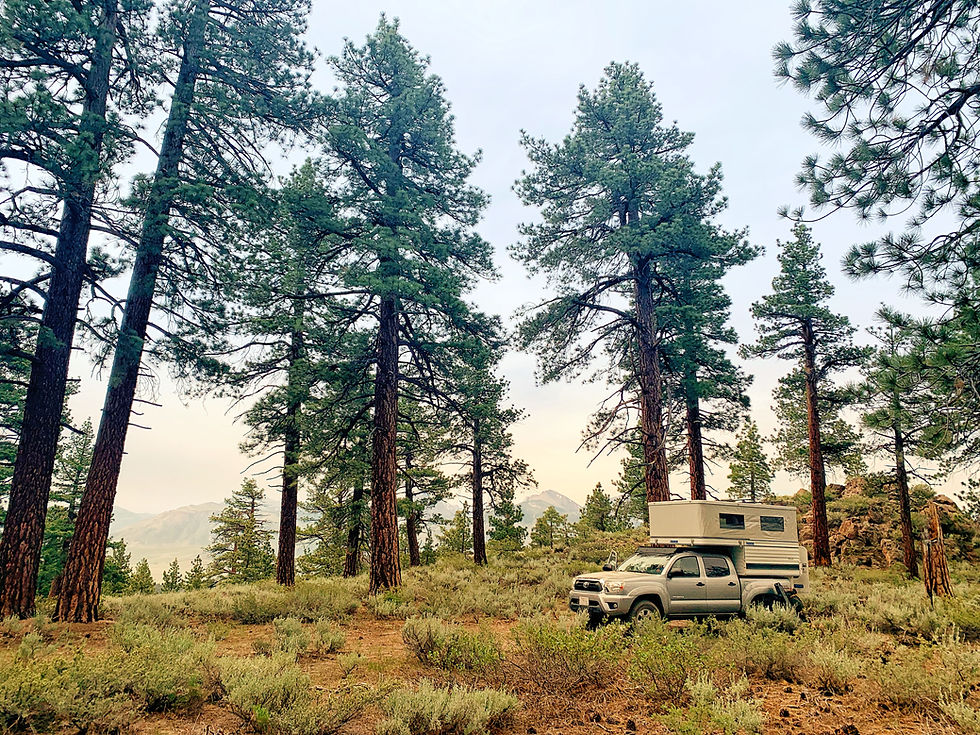BLM and Forest Service Lands Camping Guide
- Meredith Dennis
- Sep 23, 2021
- 3 min read
Contributor: Meredith Dennis

Finding a camping spot in a national park can be downright impossible depending on the time of year. Thankfully there are a wide range of camping opportunities in prime locations just outside the parks if you know where to look!
Introducing the Bureau of Land Management and the Forest Service!
The Bureau of Land Management (BLM) and Forest Service are two federal agencies that oversee public land designated as “multi-use,” meaning there are a wider array of recreational and commercial activities permitted than in national parks.
Why Choose BLM or Forest Service for Camping?
There is often a combination of either Forest Service or BLM land just outside many of the most popular national parks, and both agencies offer developed campgrounds as well as dispersed camping. Many of these campgrounds are first-come, first-served and are less well known than national park campgrounds.
How to Find Camping Spots on BLM or Forest Service Land

Recreation.gov is the first place I start when I’m trip planning. You can type in a specific campground, national park, or general area (i.e., “Camping Utah”) and the map will populate with all the developed camping opportunities on federal land. This includes BLM, Forest Service, and National Park campgrounds. For sites that require a reservation, you can pay the fee right on recreation.gov. If there are first-come, first-served campgrounds, the website will give you the details on what to expect including what types of amenities the sites have as well as the cost and maximum number of people allowed per site.
Pro Tip: Notice that most of the camping opportunities that popped up when I typed in “Camping Utah” are in green areas. The green areas on Google Maps usually indicate some kind of public land—and this often means there’s a camping opportunity there.
Dispersed Camping on BLM or Forest Service Land

Dispersed camping: this is any camping not within an established campground. Dispersed camping can seem intimidating to new campers, but with practice it can be a fun way to explore a new area and find that super secret camping spot that is special to just your family.
Generally speaking, you can disperse camp anywhere on Forest Service or BLM land providing there isn’t explicit instructions not to. Dispersed camping is usually free and you can often stay in the same place for up to two weeks (although this rule varies by region).
Dispersed camping spots are not officially marked; most people drive along a dirt road and find a spot to pull off the road and either camp in their car or right next to their car. When doing dispersed camping you need to drive on established roads and only camp in areas that have already been cleared and previously used as dispersed camping spots. Dispersed campers must also follow Leave No Trace principles to ensure the area stays as pristine as possible.
If you want to have a campfire or use a gas cooking stove you do need to obtain a permit, but these are free and can be obtained in person at a ranger station or online here in just a few minutes.
Navigating Dirt Roads While Dispersed Camping
Navigating on dirt roads is not quite as simple as plugging in an address on Google Maps, but there are lots of tools to help take the stress out of it. Know that these types of dirt roads can vary widely in how well they are maintained or labeled and while you may have excellent cell service, be prepared to be without it.
Pro Tip: Call ahead to a ranger station to find out the latest road conditions if you’re nervous!

The BLM and Forest Service offer free physical maps at their ranger stations, digital maps that are compatible with the navigation app Avenza (some maps are free, some cost a few bucks), as well as printable maps. Avenza works offline so it’s a good navigation buddy for dispersed camping adventures.
There’s lots of beautiful public land out there, so have fun! And of course, don’t forget to tag #EternalTravelBoutique on your next camping adventure and let us know how it went!

Comments